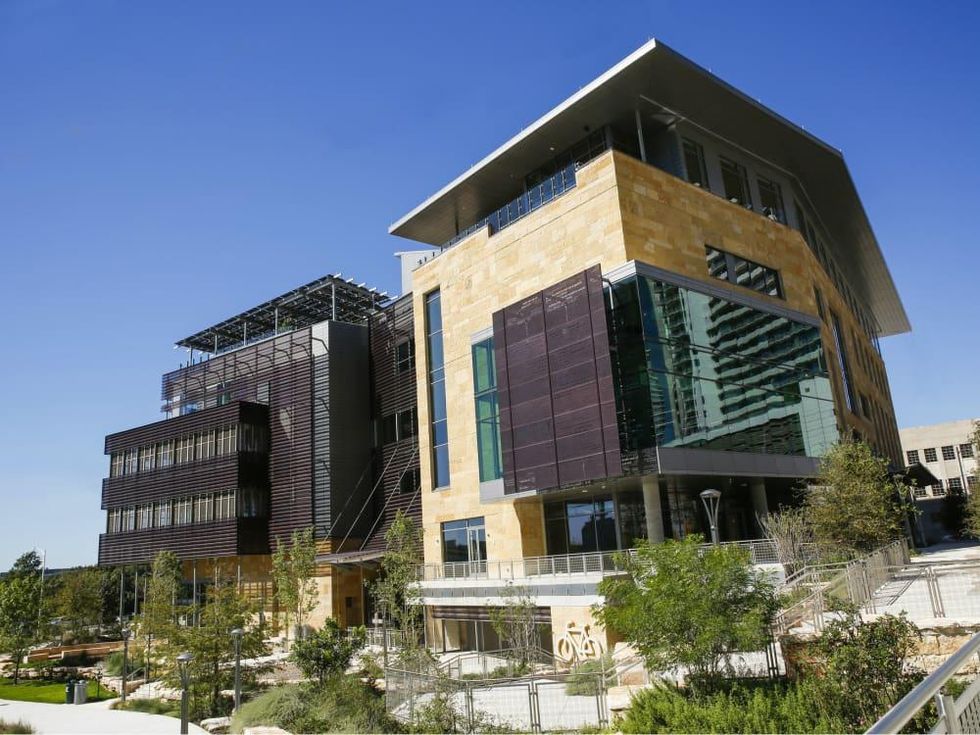History of Austin
Central Library opens new chapter in Austin's long love affair with books
On October 28, the new Austin Central Library opened in the heart of downtown at 710 Cesar Chavez St. to great fanfare and delight among the growing community.
For Austin, the new Central Library is meant to serve as a front porch for the community at large. After years of planning and four years under construction, the new 200,000-square-foot library houses 351,588 items and has 589 seats scattered throughout the interior, an event area, designated parking spots for bicycles, an art gallery and children's space, an area for teens, reading porches overlooking Shoal Creek and Lady Bird Lake, an atrium, hushed reading rooms, a beautifully curated gift shop, a rooftop garden, and a soon-to-open cafe featuring recipes from cookbooks in the library's collection.
Libraries have a long, storied history in Austin. Home to the world-renowned University of Texas at Austin, the city has always had a reputation for recruiting and attracting a literate population. Increasingly, the Capital City has become a high-tech hub with major employers locating here due to an educated populace and an enjoyable lifestyle.
This new library is the latest in our city's storied love affair with books. In a digital age when more people seeking news sources in digital formats, Austinites continue to support homegrown shops like BookPeople and Malvern Books. As cities and towns across the country shutter libraries due to economic factors or lack of interest, Austin has made a library the literal and figurative center of life here.
Austin's first public library
In 1913, then Mayor A. P. Wooldridge called for a municipal library to serve the city of Austin. Then, as today, this matter was long debated, and ultimately approved with vital funds being raised to build a permanent library. The site of three churches at Ninth and Guadalupe streets was selected as the location of the first temporary library. Mayor Wooldridge petitioned the state legislature and funds were raised by door-to-door canvassing for a book collection.
By June 1932, according to public records, building operations for a permanent facility had begun. In documents provided by the Austin History Center, when the new library doors opened for "book disposition" there were "throngs" of people in attendance. According to records, more than a thousand books were checked out the first day, and officials stated that there "were plenty of good books for all types of reading."
Decades later, as the Austin population continued to grow along with the need for additional shelf space, the Faulk Central Library was recommended and approved by voters, and in 1979 officially moved next door to 810 Guadalupe St. The library was named after John Henry Faulk (1913-1990) a local radio show host and storyteller who brought forward the successful lawsuit that helped end the Hollywood blacklist during the McCarthy era.
Preserving Austin's history
Following the move of the central library to Cesar Chavez Street, the Austin History Center has plans to take over the now-vacant Faulk building. The AHC, currently housed at 810 Guadalupe St., is the go-to source for historical documents and information on Austin and Travis County. "We have family archives, records of local organizations, and historical documents donated by individuals," says Mike Miller, director of the AHC.
Moving into the former library would expand AHC's ability to accommodate visiting school groups as well as provide services for local historians and newcomers to the city wishing to research the history of their new city. Material available for research includes phone books, archived copies of the Austin American-Statesman dating back to 1871 when the newspaper was known as the Weekly Democratic Statesman.
As Austin continues its rapid growth, Miller feels that it is "important to maintain archival records in ensuring Austin's history doesn't disappear." There is not a concrete timetable for the move, and this will be determined by bond money approved by voters.
The next chapter
The new Central Library marks a new age for Austin's literary community. In addition to the new space, Austin Public Libraries is entering a new era. In August, it was announced that Roosevelt Weeks, formerly of Houston Public Library, would replace outgoing director Brenda Branch after 40 years spent with APL. As the organization's new head, Weeks is in charge of 416 employees working at 20 branches across the city.
Public libraries have always provided free and equal access to information in whatever format people are using at the time. Today's libraries are more than just books, they are community-centered spaces with state-of-the-art technology. Libraries of the future will adapt new methods of information delivery. Regardless of what the future holds, spaces like Austin's new Central Library will continue to help transform communities and contribute to an improved quality of life for everyone.

